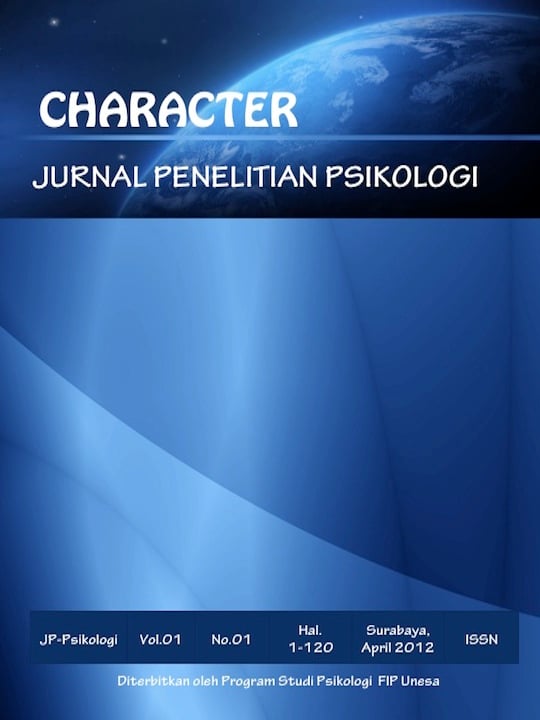HUBUNGAN ANTARA KEJENUHAN DENGAN MOTIVASI BERPRESTASI PADA ATLET SEPAK BOLA
DOI:
https://doi.org/10.26740/cjpp.v8i3.41205Abstract
Abstrak
Sepak bola merupakan salah satu cabang olahraga prestasi, motivasi pada atlet dibutuhkan sebagai landasan bagi atlet yang ingin berprestasi. Latihan yang repetitif diperlukan agar atlet dapat bertanding secara maksimal, tanpa disadari hal itu justru berdampak pada kejenuhan pada atlet. Kejenuhan pada atlet berpotensi memberi dampak pada motivasi atlet. Oleh sebab itu penelitian ini bertujuan untuk mengetahui hubungan antara kejenuhan dengan motivasi berprestasi pada atlet sepak bola. Penelitian ini dilakukan dengan metode kuantitatif. Teknik sampling yang digunakan adalah accidental sampling sehingga dihasilkan sampel sejumlah 35 orang atlet Unit Kegiatan Mahasiswa(UKM) sepak bola dengan rentang usia 19-24 tahun yang berjenis kelamin laki-laki. Instrumen yang digunakan dalam penelitian ini adalah adaptasi skala kejenuhan dengan koefisien reliabilitas sebesar 0,847 dan adaptasi skala motivasi berprestasi dengan koefisien reliabilitas sebesar 0,921. Teknik analisis data menggunakan uji korelasi product moment. Hasil analisis data menunjukkan nilai koefisien korelasi sebesar -0,440 dengan taraf signifikan sebesar 0,008 < 0,05. Berdasarkan hasil tersebut disimpulkan bahwa ada hubungan negatif antara kejenuhan dengan motivasi berprestasi pada atlet sepak bola. Semakin tinggi kejenuhan maka semakin rendah motivasi berprestasi pada atlet sepak bola, begitupun sebaliknya. Atlet yang memiliki kejenuhan menyebabkan ia menjadi malas berlatih dan kehilangan tujuannya untuk berprestasi. Akibatnya, motivasi atlet untuk berprestasipun berpotensi rendah.
Kata kunci: Kejenuhan, Motivasi Berprestasi, Sepak Bola.
Abstract
Football is a sport of achievement, motivation for athletes is needed as a foundation for athletes who want to excel. Repetitive exercise is needed so that athletes can compete optimally, without realizing it, it actually has an impact on saturation of athletes. Saturation in athletes has the potential to have an impact on athlete motivation. Therefore, this study aims to determine the relationship between boredom and achievement motivation in soccer athletes. This research was conducted with quantitative methods. The sampling technique used was accidental sampling, resulting in a sample of 35 athletes from the Football Student Activity Unit (UKM) with an age range of 19-24 years who were male. The instrument used in this study is the adaptation of the saturation scale with a reliability coefficient of 0.847 and the adaptation of the achievement motivation scale with a reliability coefficient of 0.921. The data analysis technique used the product moment correlation test. The results of data analysis showed the correlation coefficient value of -0.440 with a significant level of 0.008 <0.05. Based on these results, it can be concluded that there is a negative relationship between saturation and achievement motivation in soccer athletes. The higher the saturation, the lower the achievement motivation in soccer athletes, and vice versa. Athletes who have saturation cause them to be lazy to train and lose their goal to excel. As a result, the athlete's motivation for achievement has the potential to be low.
Keywords: Boredom, Achievement Motivation, Football.
Downloads
Downloads
Published
How to Cite
Issue
Section
License
Authors who publish in this journal agree to the following terms:
Copyright in any article is held by the author.
The author grants the journal, publication rights with the work simultaneously licensed under a Creative Commons Attribution License that allows others to share the work with an acknowledgment of the work's authorship and initial publication in this journal.
Authors may enter into separate, additional contractual arrangements for the non-exclusive distribution of the journal's published version of the work (e.g., posting it to an institutional repository or publishing it in a book), with an acknowledgment of its initial publication in this journal.
Authors are permitted and encouraged to post their work online (e.g., in an institutional repository or on their website) prior to and during the submission process, as this can lead to productive exchanges, as well as earlier and greater citation of published work.
 Abstract views: 1864
,
Abstract views: 1864
, PDF Downloads: 2864
PDF Downloads: 2864





